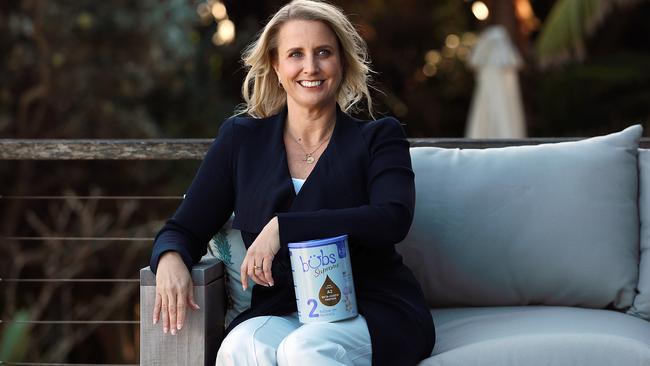Bubs Australia is looking to triple its capacity to meet new growth opportunities in the US
Infant formula manufacturer Bubs will use its deal to ride to the rescue of the US market to turn the North American market into a new long-term export opportunity.

Bubs Australia will leverage its unprecedented endorsement by US President Joe Biden, who welcomed the deal to ship 1.25 million infant formula cans to the US to ease its crippling national shortage, by considering an expansion of its Australian plant that could triple capacity.
Bubs chief executive Kristy Carr told The Australian that the $300m ASX-listed infant milk specialist was now contemplating adding an extra production line at its factory in Dandenong, with its years long plans to break into the giant US market now accelerated by the urgent request for tins from the US government.
The Federal Drug Administration, the powerful gatekeeper to the US market covering all health and drug products, late on Friday gave the green light to the importation of several varieties of baby formula manufactured by Bubs, making it the first international infant formula maker to enter the depleted US market.
Ms Carr said the first batch of 500,000 tins had been wrapped and was ready for immediate shipping to the US, with the total order for the US guided by the government equal to 600 tonnes of formula. Currently its Melbourne facility can produce 10m tins annually but that could soon triple based on the company’s projections for the US as a new and important export market well after the current baby formula crisis in the US recedes.
“Our wholly owned facility has the capacity to produce 10m per annum now, and we are now seriously evaluating putting in a second line, because of the US, and that will allow us to triple our capacity,” she said.
“We are absolutely seeing America as a long-term, sustainable strategy and had already made the decision to invest in that being the case.
“So this window of opportunity to go into mass retail and get significant consumer awareness is right now, right in the next few months only, and we are able to get widespread shelf space and that is important.”
Ms Carr said a new line would cost $5m to $8m which the company could fund itself. She said then Bubs would help educate US families about the benefits of the Bubs brand and hopefully win them as rusted-on consumers who will stick with the brand as their babies grow.
“Once we are able to communicate the Bubs story to American families and those consumers who trust the brand and tried the brand and keep their babies on our infant formula it’s very rare for a family to switch brands,” she said. “So we will be working through to get the permanent regulation stamp of approval, but we are definitely seeing the US as a long-term strategy for us.”
Ms Carr said Bubs had begun two years ago planning its assault on the US market, which it saw as a major opportunity for its brands of infant milk formula and other infant foods which include an organic range and goat milk-based baby formula highly sought after by parents whose children have allergies.
This early work on the US market helped Bubs win approval after the US government’s international calls to replenish its exhausted supplies of infant formula as it had already gone through regulatory and food security checks.
“We started about two years ago looking at the US, and we have spent a year going through all the route to market processes including regulatory and we launched our Bubs toddler formula in the US about a year ago, and this is one of the reasons why we are so well placed now,” Ms Carr said. “Because not only had we gone through the entire regulatory FDA process … but we had set up all the infrastructure we needed on the ground.”





To join the conversation, please log in. Don't have an account? Register
Join the conversation, you are commenting as Logout